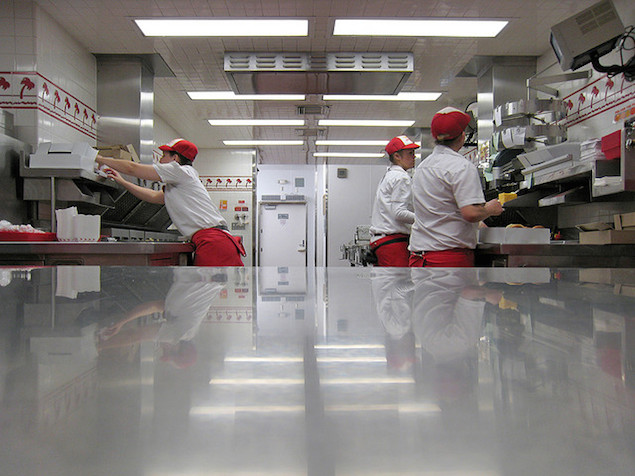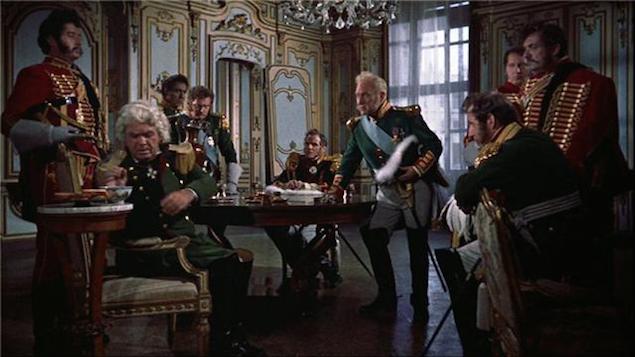Work • Business Skills
On Meaning – and Motivation
Of course we go to work for money and the people you meet can be great. But a lot of the time – though we might not quite put a finger on it exactly – we’re also looking for something else from our work: a sense of meaning.
When we talk about jobs being meaningful or meaningless, we are at heart asking whether these jobs are helping anyone’s life to go better: we’re wondering whether our work stands a chance of increasing someone’s pleasure or reducing their suffering. Unlike what standard economics tells us, we’re desperate to make a significant contribution to the good. It’s hard to be happy at work without a sense that we’re helping others.
© Flickr/Seattle Municipal Archives
The worry that work is not meaningful tends to announce itself in one of five main ways:
1. My job feels meaningless because the products are trivial
‘My job’s OK day-to-day, it’s interesting managing quite a big team. But in the end we’re only making paper clips. Nothing wrong with that. We do it really well. You’d be surprised by the size of the market. But speaking personally it somehow feels a bit trivial: if all goes well, I will have helped someone to keep their papers in order. I’ve been here five years. I sometimes wonder if I’m wasting my life.’
2. My job feels meaningless because I’m a tiny cog in a huge machine
‘I don’t want to complain. I’m glad to have a job. We’re in biotech and maybe for the guys at the top and the researchers it’s all very worthy. But I’m not doing that. I’m just dealing with pay dates and when people are on leave. I also have to make sure there’s toner in the printers on the 9th floor and that we’ve practiced the fire drill according to the regulations. It gets me down to think there’s all these amazing things going on in the company and I’m not really part of it.’
© Flickr/brianwallace
3. My job feels meaningless because I don’t respect my customers
‘I work front of house in a really smart restaurant – you’d know the chef from television – and there are lots of things to love. But frankly a lot of the customers put me off. It’s depressing sometimes: they’re bitchy, often thinking you’ve ripped them off – and never ever say thanks. And quite often there are couples out for a big meal who seem so nasty and spoilt.’
4. My job feels meaningless because I don’t respect my bosses
‘In theory, management consultancy can sound pretty interesting. But I reckon (and please don’t tell anyone this) the people I work for are pretty cynical. They’re smarmy-polite around the big clients but, the moment they’re back in the office, they’re hard as nails. They’re always, always going on about the bottom line, and the return on capital.’
5. My job feels meaningless because any difference we make happens so slowly
‘The company I’m with is one of the biggest on the planet: we’re literally, on every continent. People think that’s an exaggeration but I mean I think we actually do have something around the Antarctic, though I don’t know exactly what it’s to do with. The scale of projects is massive but the pace is horrifyingly slow. Sometimes you work developing something for ten years (I did on the geothermals of a proposed pipeline) but day-to-day, it’s just mind-numbing. Nothing feels like it’s ever changing or improving. It’s hard to have to look forward to 2021. Will I even be alive?’
Some jobs might really just be a bit meaningless: they really don’t contribute to the good; like advertising fake remedies for minor ailments, or working out how to get low-income people to gamble more, or developing financial products that benefit the seller more than the buyer.
But a lot of jobs feel less meaningful than they really are. The work the person is doing does actually makes a real contribution to the good of humanity. Only the work doesn’t feel meaningful to that individual.
That’s our target here; and there are multiple solutions.
Solutions to the Sense of Work Meaninglessness
One: My job feels meaningless because the products are trivial
Solution: Vermeerification
Many employees suffer from the feeling that their work is meaningless because, in their own eyes, what they do lacks glamour. Others, they think, are making components for rockets to go to Mars, but here they are figuring out how to make (marginal) improvements to the paper clip company’s tax position. In their view of the world, something else has glamour and what they’re involved in doesn’t.
But glamour is a remarkably variable quality.
Johannes Vermeer, The Milkmaid (1657-8)
This is one of the treasures of Amsterdam’s Rijksmuseum. If it were ever on the market, the price tag would be astronomical. About five million people jostle for a place in front of it every year, in the belief they are admiring one of the great masterpieces of Western art. You could view it as an exercise in the crucial task of re-assigning glamour. When Vermeer painted it (probably around 1658), pouring milk was not a highly regarded occupation. But he saw things differently. The painting shows the dignity and honour that such a simple task had in his eyes. The activity, as described by the painter, is no longer lowly or trivial.
In another work, The Little Street, Vermeer pushes the same thought further. The supposedly minor activities (scrubbing the tiles, darning a sock, sweeping the gutter in the yard) are in fact ways in which something very important is accomplished. Such acts bring order and grace to the physical environment. We have many needs. A clean floor is one of them. Keeping papers neat is another. Many different things in life have to be attended to for things to be okay overall, and each one is therefore connected up to the grander projects of existence.
© Flickr/David Masters
There are companies that need to get artful, to unlock their employees’ appreciation of the real worth – and hence meaningfulness – of what they do. Vermeer himself is a voice from the past, saying something important in the terms that made most sense in his own day. We could do with some corporate Vermeers to bring the message up to date – and it might be paper clips, rather than jugs of milk that they focus on first.
Two: My job feels meaningless because I’m a tiny cog in a huge machine
Solution: The Novel
There are some enemies of seeing ‘meaning’ that have arisen because of the sheer scale of businesses in modern capitalism. Corporations coordinate the labours of tens, even hundreds, of thousands of people – and raise productivity exponentially. But extreme specialisation and global reach can gravely reduce the sense of meaning that any one employee might have. A packaging supervisor in Malmo might not have much idea of how their work fits in with the activities of a geochemist in Ghana who compares activated alumina with indigenous laterite and bauxite as potential sorbents for removing fluoride from drinking water or with the concerns of a legal expert currently staying in the Alvear Hotel in Buenos Aires and reporting to a steering committee in New York about the implications of proposed revisions to Section 14 of the Argentine Mining Code. And yet all these individuals might be working for the same rather noble cause. Just none of them can quite remember day-to-day what the real cause actually is.
It seems fiendish, trying to get people to see where they fit into the whole – and hence to feel how their work is meaningful. But in fact we have a lot of cultural experience around addressing similar kinds of problem. From the middle of the 19th century, novelists started experimenting with the idea of weaving multiple plot lines together. This reached its maturity around the late 1970s in the genre of the spy story.
John Le Carré, in the year he perfected the art of coordinating multiple plot lines
Today, hypothetically, one chapter of a novel about a company might open with a description of someone accessing a bank account in Salzburg. The next thing, we’re in a restaurant in the Wan Chai District of Hong Kong where a deal is being hammered out to transfer packing crates to Dubai. Then the focus is on a meeting taking place in a basement in Whitehall concerning regulations for consumer goods. But rather than being a hopeless confusion, the point of the novel would eventually be to reveal how all of these apparently random events are in fact profoundly interconnected – and pointing to a rather grand goal. They are all manifestations of one intention: to create a new IT system for an office in Munich, say, or to increase the flow rate of a pump production line in southern Spain. Once scattered events are weaved together into a story, they can start to feel very meaningful indeed.
Ideally, every large company needs to deploy the resources of narrative: they need their own version of the spy story to tie elements together and should, perhaps, have some novelists on their payroll.
Three: My job feels meaningless because I don’t respect my customers
Solution: Intrinsic Value
Jean-Baptiste-Siméon Chardin, The Convalescent’s Meal (1747)
For all we know, the poorly individual whose lunch is being so devotedly-prepared is a crabby, opinionated husband. Or maybe they’re a very frustrated adolescent given to taking out their anger at being cooped up in bed on the only person around to dump it on. Or it’s maybe a rich employer with a painfully over-developed sense of entitlement.
But in Chardin’s eyes, it seems, none of this matters too much. The woman isn’t simply doing this for the other person. She’s shelling the hard boiled carefully because she likes to do things well. If there were a little bit of the shell left, she’d feel that wasn’t right. She loves the perfect, glistening shape; she’s absorbed in her work and focused on doing everything as well as she can, making sure everything is perfect.
She’s learned a vital trick. Even if the other person – the customer, in effect – doesn’t appreciate what she’s doing, she sees its worth. She’s doesn’t have to depend on the approval of another person to respect her own values and to want very ardently to live up to them. She likes things done a certain way, and doesn’t need a cheering gallery to support her. You can also tell her values from the well-polished little cup, the perfectly baked loaf of bread, and the neatness of her apron.
This strength of character can translate into commercial situations. The customers (perhaps it’s an airline or a hotel, a clothing chain or a spa) may be silent, preoccupied, undemonstrative or just rude. But they are turning up all the same; however imperfect their manners, they are actually paying. It’s the culture of the business that must compensate for their churlishness. It can adopt a Chardin-like perspective, which means setting the feeling of the worth of an activity free from the response of the customers. Self-respect takes the place of adulation.
When hatred of customers threatens motivation, another avenue of progress lies in the direction of curiosity. It’s easy to hate customers. Those being served are often richer than those doing the serving. It can hence be hard for the person making the bed, or bringing the sole dauphinoise from the kitchen to the table, or fitting a pair of shoes that would cost a fortnight of their own wages, to feel much sense that they are contributing to the good of humanity by attending to these particular spoilt brats they are in charge of.
The fact is, though, we tend to know little of the lives of others. What we see on the surface might be wildly misleading. The boorish, apparently ungrateful tourist at the luxury hotel may have built their wealth through unremitting devotion for two and a half decades to providing used cars at the fairest prices to people in the south-western suburbs of Minneapolis. They’re maybe terrible at showing gratitude to a chambermaid or the concierge, but they’re truly excellent in many other (though currently invisible) ways, which you’d grasp very quickly if you met them in another context: looking for a reliable 2008 Dodge Stratus.
In the hotel, the restaurant or the shoe shop you’re seeing only a fraction of the individual. That fraction might not be too lovely. But it really isn’t a guide to the whole person.
Four: My job feels meaningless because I don’t respect my bosses
Solution: Upward Imagination
It’s easy to hate one’s boss. But the real challenge, which may also help one to regain motivation, is to try to imagine what it is like to be the boss.
War and Peace: The externals have changed, but the account of the mind of the boss is still useful
Some of the problem comes down to the fact that our culture is a bit short on realistic, sensitive descriptions of bosses, and of people in positions of authority generally. A big exception, however, is Tolstoy’s War and Peace, first published in 1869. Tolstoy was hugely interested in what it’s like to be in charge. In the novel, the junior characters are always going on about how stupid the people in power are. A lot of blame circulates. Then Tolstoy takes us into the some of the grim decision-making situations that people in power actually face. It’s 1812, Napoleon’s armies have swept through Russia, they’re within striking distance of Moscow. It’s unthinkable, surely, that the enemy should take that city, the emotional heartland of the nation. The commander of the army – Kutuzov – has to decide whether to preserve the army or preserve the city. He makes a swift, brutal and totally right decision. Save the army. Kutuzov isn’t very nice in the standard ways. Tolstoy is careful to let us see this. But he attains a certain dignity nevertheless, once you can see that he stands in a terrifying place and has to face some very big, fearful issues, as many bosses do.
Often enough, the feeling that it’s meaningless to work for someone results from a misunderstanding as to why they act as they do: why they are short-tempered, in a hurry, preoccupied, gloomy and tricky to be around. Each company needs its own local version of Tolstoy who can more sympathetically take the employees into the mind of the boss, so that motivation is not lost through sheer incomprehension of what life might be like through someone else’s eyes.
Five: My job is meaningless because any difference happens so slowly
Solution: The Lessons of History
People want to feel that they are progressing the world. That’s understandable. But quite often, in fact, what they are doing is indeed contributing to the betterment of the world. It’s just going to take a very very long time. Day-to-day, it won’t feel like much progress is being made – and yet it is, just bit by bit, extremely slowly.
Such images feed a sense of frustrated impatience – and hence make work feel less meaningful than it is
In 1830, the French painter Eugene Delacroix produced an amazing image of radical action: the good guys storm forwards, the enemies of progress are swept aside (some of them die), the new world is being born. Sunlight breaks through the clouds. This is the extreme version of a dominant idea of what it means to change stuff: namely, that you’ll feel the difference right now. Unfortunately – though it’s a great painting – it’s also emotional propaganda for a very misleading vision of how good change actually comes about. It makes us more impatient than we should be.
If we look on a big scale, it’s obvious that the world changes – and frequently improves. But this is only apparent when the time frame is sufficiently wide. Year by year, it might seem as if nothing is going right or that things are actually going backwards. This is the problem faced by politicians, the medical community and many companies too: they are doing good, but those who depend on them can’t see the change in a sufficiently speedy and hence meaning-laden way.
A reminder that progress is slow, messy, imperfect – and real
In 1848, the historian Thomas Babington Macaulay, published a History of England, surveying the events of the previous century and a half. He came, eventually, to the reassuring conclusion that ‘The history of the United Kingdom during the last hundred and sixty years is eminently the history of physical, of moral, and of intellectual improvement.’ He wasn’t in the least ignoring the facts that in that time there had been two major rebellions in 1715 and 1745, a disastrous (from the English point of view) conflict with the US, a long and terrifying war with Napoleon, major religious riots and a transition from an agricultural to an industrial economy that had exacted an appalling human cost. All he meant was that despite these grave matters, genuine progress had been made.
It’s a theory of good development that teaches us an important lesson in patience. And also in gradual accumulation. The big benefits to a nation (and by implication a company or individual) may not come about via any single grand event, like the storming of the Bastille. In England’s history, there was a piece of legislation here, an improvement in productivity there, a school was built in Chester, a road was resurfaced in Northumberland, pipes were laid to improve the water supply in Plymouth: thousands of individually relatively minor activities connected together over time gradually added up to momentous transformation. But on the ground at any particular moment it probably wouldn’t have felt as if much real progress was being made.
What Macaulay did was to trace the benefits of cumulative effect. It’s a crucial move that all companies should learn from if they wish to keep their more impatient and Romantic employees on board.
Conclusion
Typically management might see the ‘meaning’ of any particular job in terms of its contribution to the overall financial success of the company. That, after all, is ultimately how the position is justified and why it is worth employing someone to do it.
But this rationale does not connect with the human experience of meaning. Hardly anyone can find their work meaningful because it secures a marginally superior rate of return on capital to the shareholders than they could obtain from a rival investment. It is indeed essential to a corporation to achieve this, otherwise they will eventually go out of business, but the financial success of a company is always quite distant from the concerns of the average employee. It happens somewhere very far away. Of course, theoretically they know perfectly well that their work depends on the economic health of the enterprise. Only it’s not a big personal motive. It’s in the day-to-day experience that a job feels meaningful – or not. And this is a huge matter. Because the sense of meaning is one of the things that determines the greatest issue of all: how hard and well people will work.




































